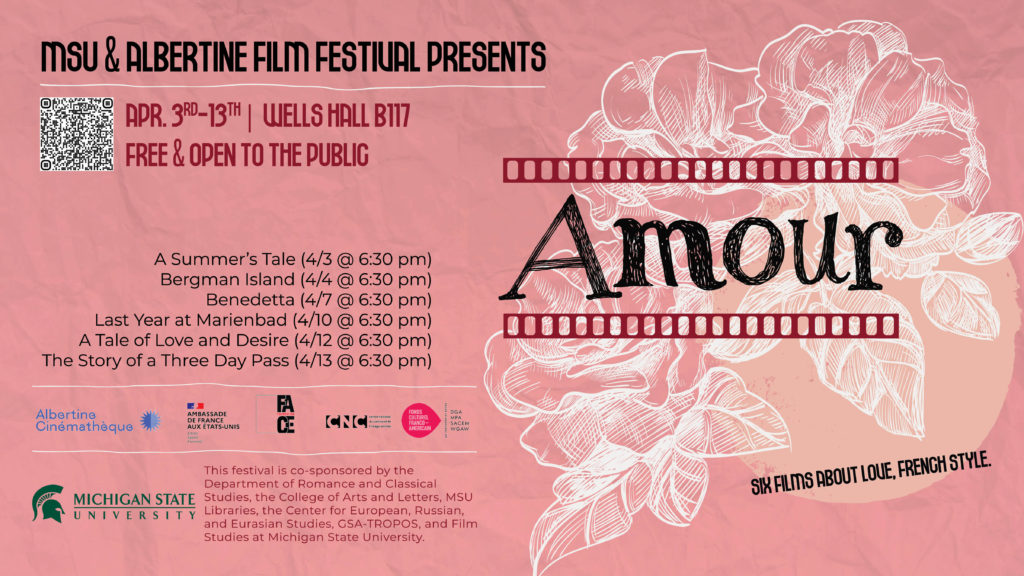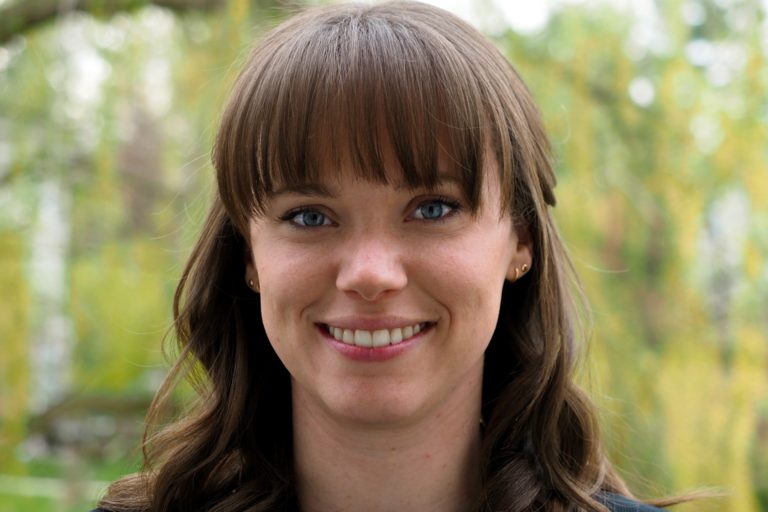The MSU Albertine Cinémathèque French Film Festival, which will bring six contemporary and classic French films to Michigan State University’s campus, will be held on select dates from April 3 to 13. All films are open to the public and will be shown free of charge in Wells Hall B-117.
This year’s theme is AMOUR/LOVE with each film exploring a different aspect of love: romantic, artistic, spiritual, sensual, and forbidden.
Assistant Professors Elizabeth Tuttle and Jena Whitaker in the Department of Romance and Classical Studies at MSU received the Albertine Cinémathèque French Film Festival grant, which is helping to fund the festival. Graduate student film fellows Laetitia Kokx, Hannah Olsen, and Vanessa Weller helped organize the on-campus events.

Drs. Tuttle and Whitaker plan to make the film festival biennial to complement the existing Latinx and Italian Film Festivals offered by the Department of Romance and Classical Studies.
Albertine Cinémathèque is a program of FACE Foundation and Villa Albertine, which aim to promote French-American cultural exchange in education and the arts on American college and university campuses. MSU’s Albertine Cinémathèque French Film Festival also is supported by the Centre National du Cinema (CNC) and Fonds Culturel Franco-Americain (SACEM) and co-sponsored by the Department of Romance and Classical Studies; the College of Arts & Letters; MSU Libraries; the Center for European, Russian, and Eurasian Studies; and Film Studies at Michigan State University.
Below is the festival schedule. For more information, please visit the MSU Albertine Cinémathèque French Film Festival website.
A Summer’s Tale (Un conte d’été) (1996)
Monday, April 3, at 6:30 p.m.
Presented by Valentina Denzel, Associate Professor of French Language and Literature
A Summer’s Tale follows amateur musician Gaspard (Melvil Poupaud) to a seaside resort in Dinard on the coast of Brittany. There, three women (Amanda Langlet, Gwenaëlle Simon, and Aurelia Nolin) offer the possibility of romance, but Gaspard’s inability to commit to just one puts all of them in jeopardy.
Bergman Island (2021)
Tuesday, April 4, 6:30 p.m.
Presented by Kaveh Askari, Associate Professor and Director of Film Studies
A couple of American filmmakers, Chris (Vicky Krieps) and Tony (Tim Roth) retreat to the mythical Fårö island for the summer. In this wild, breathtaking landscape where Ingmar Bergman lived and shot his most celebrated pieces, they hope to find inspiration for their upcoming films.
Benedetta (2021)
Friday, April 7, 6:30 p.m.
Presented by Hannah Olsen, Ph.D. Candidate in French
In the late 17th century, with plague ravaging the land, Benedetta Carlini joins the convent in Pescia, Tuscany, as a novice. Capable from an early age of performing miracles, Benedetta’s impact on life in the community is immediate and momentous.
Last Year at Marienbad (L’annee dernière à Marienbad) (1961)
Monday, April 10, 6:30 p.m.
Presented by Safoi Babana-Hampton, Professor of French and Francophone Studies
Through ambiguous flashbacks and disorientating shifts of time and location, this film explores the relationships among the characters in Kafkaesque fashion.
A Tale of Love and Desire (Une histoire d’amour et du désir) (2021)
Wednesday, April 12, 6:30 p.m.
Presented by Daniel Smith, Assistant Professor of Theatre Studies
While discovering a collection of sensual and erotic Arab literature he never imagined existed, Ahmed falls head over heels in love with Farah, and although literally overwhelmed with desire, he will try to resist.
The Story of a Three-Day Pass (La permission) (1967)
Thursday, April 13, 2 p.m.
Presented by Sinclair Portis, Ph.D. Candidate in English
Channeling the brash exuberance of the French New Wave, Director Melvin Van Peebles creates an exploration of the psychology of an interracial relationship as well as a commentary on France’s contradictory attitudes about race that laid the foundation for the scorched-earth cinematic revolution he would unleash just a few years later with Sweet Sweetback’s Baadasssss Song.


